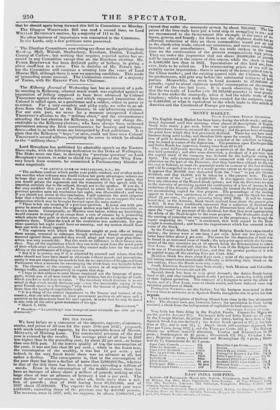Lord Brougham has published his admirable speech on the Eastern
Slave-trade, with the following dedication to the Duke of Wellington. The Duke must see that, in moving the "previous question" on Lord Brougham's motion, in order to shield his prot6ges at the Whig Trea- sury bench from censure, be committed a Parliamentary blunder of some magnitude.
"TO ARTHUR DUES OF WELLINGTON, E.G., &C.
"The uniform candour which guides your public conduct, and so often makes you sacrifice what ordinary men would reckon fair party advantages, induces me to hope that you will listen to the earnest entreaty which I now make, that you would peruse the arguments and the statements of this speech with the attention certainly clue to the subject, though not to the speaker. If you do, I feel very confident that you will be disposed to admit that your moving the previous question upon my resolutions last night, was ill.considered ; and even if you should not arrive at this conclusion, I still entertain the most sanguine hope that a further attention to the subject will incline you to support the next proposition which may be brought forward upon the same matter. "There is but one meaning of a previous question. It never can with pro- priety be moved unless when the original motion was hell to be irresistible on its own merits. Consequently, no Ministry ever before, within my knowledge, would consent to accept of an escape from a vote of censure by a proceeding which admits their guilt or their error, and only professes an unwillingness to condemn them. Unless the truth of the resolutions was undeniable, the pre- vious question last night could have no meaning, and my motion should have been met with a direct negative. " The eagerness with which the Ministers caught at your offer of letting them escape, censured in substance though without a formal seutence pro- nounced against them, provided they would adopt and enact your plan them- selves, was very remarkable. But this made no difference in their former con- duct. Nay, ad the regulations which they can make must leave the worst parts Of their whole error untouched, because they cannot make laws for the coast of Africa or the settlements of foreign crowns. " But if it is certain, nay if it is admitted by yourself and others, that this order should not have been issued at all events without guards and precautions, surely it was not expecting too much to look for an expression of d isuppi oval from Parliament when a measure fur encouraging the slave-trade was brought before it. The character of the country, and its success in all negotiations on the foreign traffic, seemed imperatively to require that step. " I have in this address to your Grace employed not the language of pane- gyric, which you of all men would the most despise, but the language of ti Lath, which you know well how to value. 4 The treachery which deceives is aa cri- minal as that which would dethrone you '—was the memorable saying of the great French orator to a Sovereign* who loved the treason of pleasing flattery more than the loyalty of unpalatable truth. 4‘ It is a thing of the utmost importance to the honour and interest of the country, that one who stands iii your preaminent position sh,aild upon such a question as the slave-trade have Ilk eyes opened, in order that he may be found to side with all the other great statesmen of his age. " March 7, Md. BROUGHAM."
• Massilton—' La rerildie quit cons trompe est awed erioduelle quo cello qui you detroueroit."


























 Previous page
Previous page